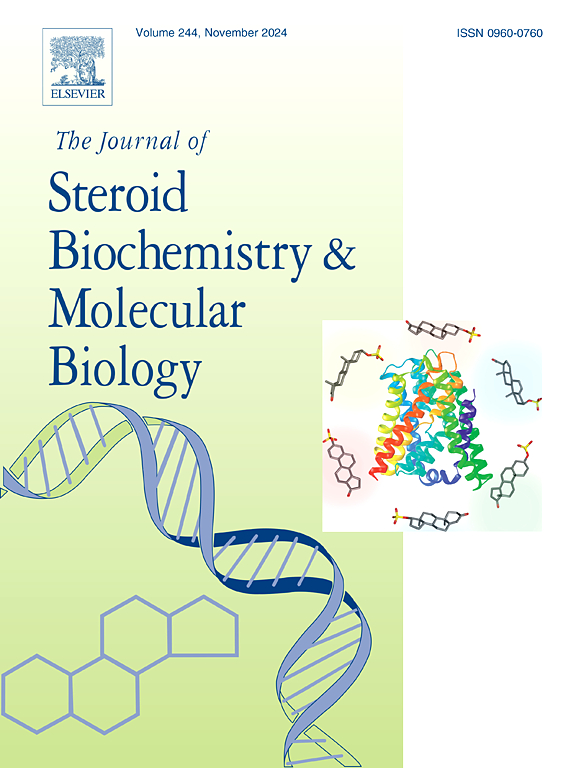双酚Z通过上调METTL3表达抑制成年雄性大鼠间质细胞功能
IF 2.5
2区 生物学
Q3 BIOCHEMISTRY & MOLECULAR BIOLOGY
Journal of Steroid Biochemistry and Molecular Biology
Pub Date : 2025-05-19
DOI:10.1016/j.jsbmb.2025.106786
引用次数: 0
摘要
由于双酚A的毒性,它的使用受到限制。然而,其替代品双酚Z (BPZ)对间质细胞功能的影响仍不确定。我们的目的是通过上调Mettl3和诱导氧化应激来研究BPZ暴露与间质细胞功能破坏之间的关系。为了解决这个问题,在体内,雄性成年spraguedawley大鼠口服BPZ(0、1、10或100 mg/kg/d) 7天,在体外,纯化的间质细胞用BPZ(0 - 20 μM, 24 h)处理。观察间质细胞形态和功能。结果表明,BPZ不改变大鼠间质细胞数量,但显著降低血清睾酮水平。显著下调Leydig细胞中SCARB1、STAR、CYP17A1、HSD17B3、INSL3等基因和蛋白的表达水平。同时,BPZ处理导致抗氧化基因(Gpx1和Cat)的表达减少,在睾丸中RNA甲基化片段富集后,m6A相关基因(Mettl3)表达上调。对原代间质细胞的体外分析表明,BPZ增加了氧化应激,减少了睾酮的产生。综上所述,BPZ通过METTL3-m6A-Camkk2途径下调甾体生成基因(Star、Scarb1、Cyp17a1和Hsd17b3),从而降低大鼠睾丸激素,损害间质细胞功能。本文章由计算机程序翻译,如有差异,请以英文原文为准。
Bisphenol Z inhibits the function of Leydig cells via upregulation of METTL3 expression in adult male rats
The use of bisphenol A has been restricted due to its toxicity. However, the impact of its substitute, bisphenol Z (BPZ), on Leydig cell function remains uncertain. We aimed to examine the associations between BPZ exposure and the disruption of Leydig cell function via upregulating Mettl3 and inducing oxidative stress. To address this, in vivo, male adult Sprague-Dawley rats received BPZ (0, 1, 10, or 100 mg/kg/d orally) for 7 days, and in vitro, purified Leydig cells were treated with BPZ (0–20 μM, 24 h). Leydig cell morphology and function were assessed. The results showed that BPZ did not alter Leydig cell quantity but notably decreased serum testosterone levels. Furthermore, it significantly downregulated the expression levels of genes and proteins (SCARB1, STAR, CYP17A1, HSD17B3, and INSL3) in Leydig cells. Concurrently, BPZ treatment led to diminished expression of antioxidant genes (Gpx1 and Cat), an upregulation in m6A related gene (Mettl3) subsequent to the enrichment of RNA methylation fragments in the testis. In vitro analysis of primary Leydig cells demonstrated that BPZ heightened oxidative stress and diminished testosterone production. In conclusion, BPZ reduces rat testosterone by downregulating steroidogenic genes (Star, Scarb1, Cyp17a1, and Hsd17b3) via METTL3-m6A-Camkk2 pathway, impairing Leydig cell function.
求助全文
通过发布文献求助,成功后即可免费获取论文全文。
去求助
来源期刊
CiteScore
8.60
自引率
2.40%
发文量
113
审稿时长
46 days
期刊介绍:
The Journal of Steroid Biochemistry and Molecular Biology is devoted to new experimental and theoretical developments in areas related to steroids including vitamin D, lipids and their metabolomics. The Journal publishes a variety of contributions, including original articles, general and focused reviews, and rapid communications (brief articles of particular interest and clear novelty). Selected cutting-edge topics will be addressed in Special Issues managed by Guest Editors. Special Issues will contain both commissioned reviews and original research papers to provide comprehensive coverage of specific topics, and all submissions will undergo rigorous peer-review prior to publication.

 求助内容:
求助内容: 应助结果提醒方式:
应助结果提醒方式:


